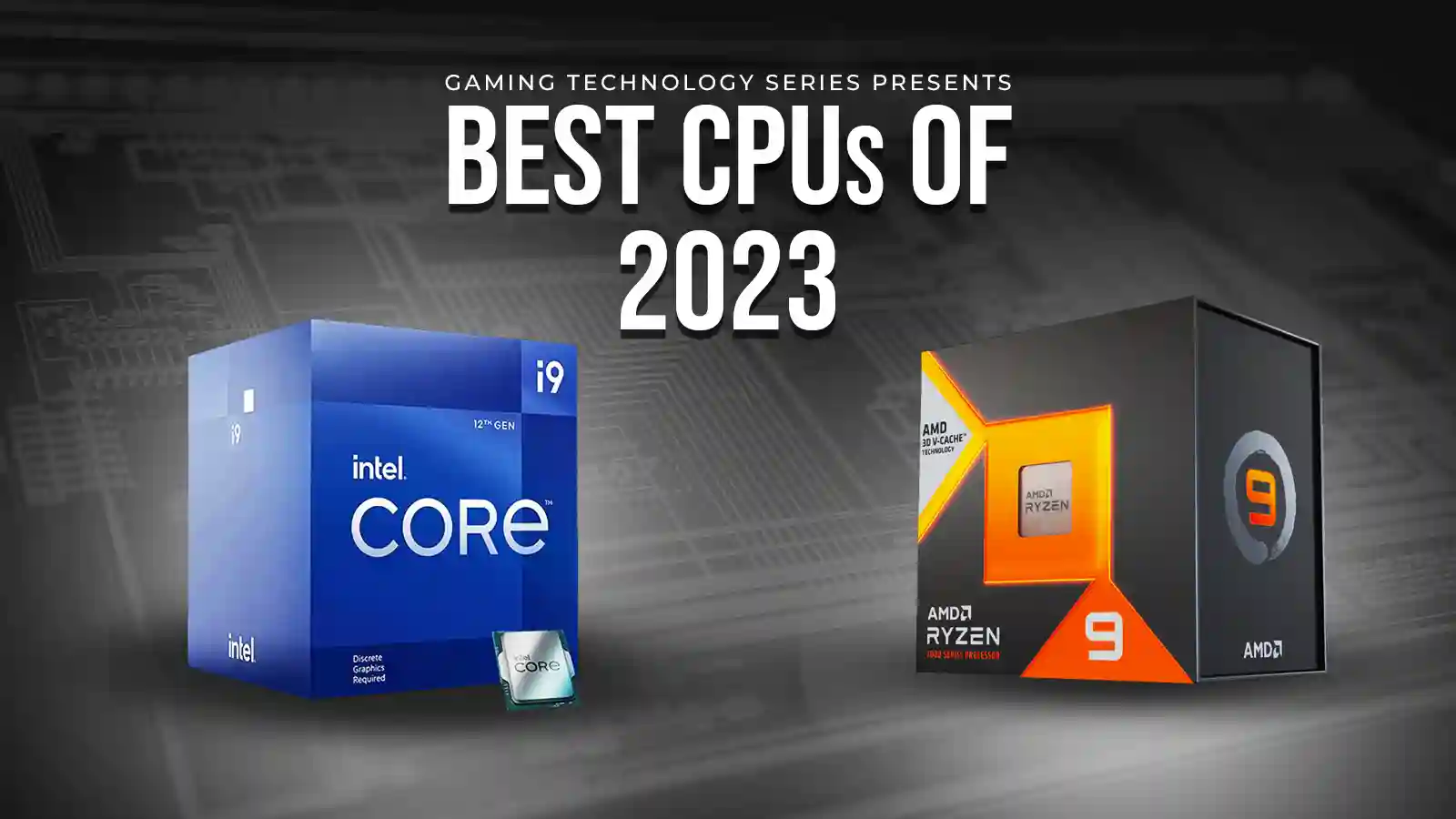Are you planning to build a PC with the latest gaming technology and struggling to find the best CPUs in 2023 for your gaming setup? Don’t worry, we got your back! We will help you with choosing the Best CPU for Gaming in 2023 for your build which is not only the top pick but also a piece of future-proof gaming technology.
In the world of gaming technology, two brands have always been fighting for the spotlight for having produced the best CPUs. You might’ve heard of these brands namely INTEL and AMD. Even today’s CPU market is dominated by these two companies with CPUs which are the future gaming technology either for better or worse.
If you have knowledge about gaming technology and know what specifications you want to get in your CPU, making a decision won’t be hard. But if you are unfamiliar with this stuff, we are here to help you with that. Our Gaming Technology Series has been written to help aid gamers despite their budget with no charges.
Currently in the world of gaming technology, one of the most powerful, fastest, and the best CPUs in 2023 is AMD’s Ryzen 7 7800X3D for obvious reasons. The Ryzen 7 7800X3D stands out as a more affordable option among AMD’s 3D V-Cache processors, with a reasonable price of $399. What distinguishes it is its ground-breaking 3D-stacked V-Cache architecture, a technical breakthrough that promises to take gaming performance to new heights. This CPU not only makes complex technology more accessible but also assures that users’ gaming capabilities are significantly improved. The Ryzen 7 7800X3D appears as an appealing solution for consumers seeking a blend of high-performance computing and a fair price point, with a focus on affordability and cutting-edge design i.e. one of the latest gaming technologies.
Gaming Technology Series Presents the Best CPUs in 2023:
Considering each factor such as the price-performance ratio, cores, threads, clock speed, etc., we have assembled the list of the best CPUs in 2023 you can buy for your gaming PC. Before we talk about each component, let us share the list of the best CPUs and in which category are they chosen by us.
- Overall Best CPU for Gaming: Intel Core i5-13400 / AMD Ryzen 5 7600
- High-Performance Value Best CPU for Gaming: AMD Ryzen 7 7800X3D / Intel Core i7-14700K
- Highest Performance Best CPU for Gaming: AMD Ryzen 9 7950X3D / Intel Core i9-13900K
- Mid-Range Best CPU for Gaming: Intel Core i5-13600K / AMD Ryzen 5 7600X
- Budget Best CPU for Gaming: AMD Ryzen 5 5600
Intel Core i5-13400 & AMD Ryzen 5 7600 – Overall Best CPU for Gaming
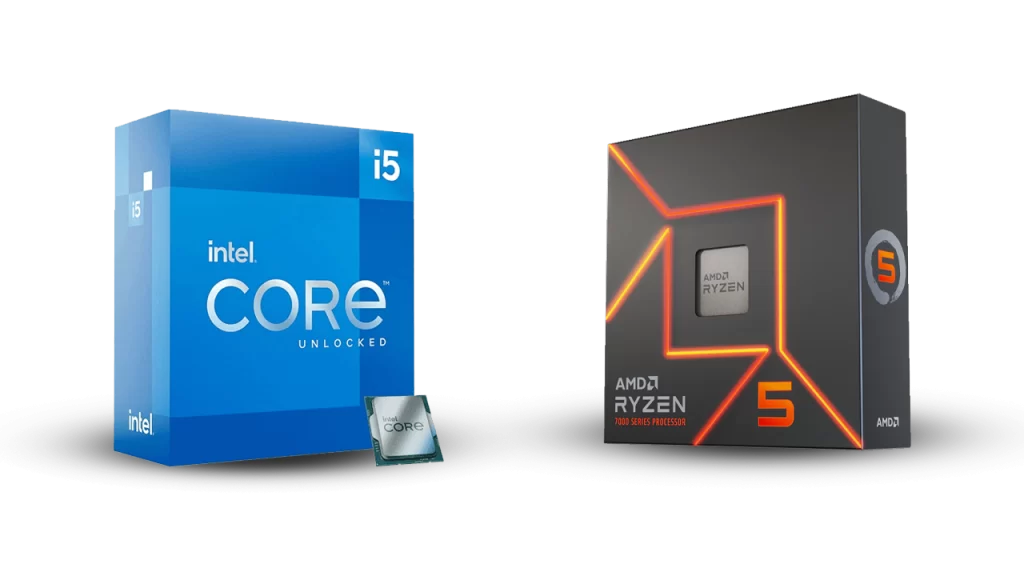
With DDR4 memory compatibility, the i5-13400 offers an unrivaled value for money in the $200 price bracket, becoming the preferred chip for affordable gaming PCs. The processor contains six P-cores that allow hyper-threading and run at a base speed of 2.5 GHz and a boost clock of 4.6 GHz. The 4 e-cores for threaded activities may reach speeds of up to 3.3 GHz. The 13400 features cutting-edge connectivity with DDR4-3200 or sufficient DDR5-4800 memory compatibility, as well as 16 lanes of PCIe 5.0 and 4 lanes of PCIe 4.0 from the CPU for M.2 SSDs.
The Core i5-13400 comes with a competent cooler that can manage its 65W/148W base/peak power rating, and you may use it with either a modern 700-series or a former 600-series motherboard if the BIOS supports the processor. Most gamers will appreciate DDR4’s reduced price and equivalent performance, but if you want higher memory efficiency, you can upgrade to the more costly DDR5. Intel’s partners sell B- and H-series motherboards, and a B660/B760 motherboard combined with a Core i5-13400 CPU creates an excellent gaming setup.
AMD’s Ryzen 5 7600 is undoubtedly the best-value mainstream CPU on the market right now, offering outstanding performance for a low price. This processor has 6 CPU cores and can reach speeds of up to 5.1GHz thanks to thread-doubling SMT capability. The processor also has a low-level integrated graphics processor (IGP) that isn’t capable of handling games but is adequate for non-gaming visual tasks. It’s also worth noting that AMD includes a Wraith Stealth cooler with this variant. This cooler is mediocre, but it saves you from having to buy one for simple operations.
When compared to the Ryzen 5 7600, the Core i5-13400/F’s DDR4 option and typically better Intel motherboard pricing can save $135 in overall system expenditures. Naturally, this results in a far better overall price – you’ll pay 35 percent more for the Ryzen gaming technology and an additional 25% per frame to receive the 7% gain in 1080p game performance.
AMD Ryzen 7 7800X3D & Intel Core i7-14700K – High-Performance Value Best CPU for Gaming
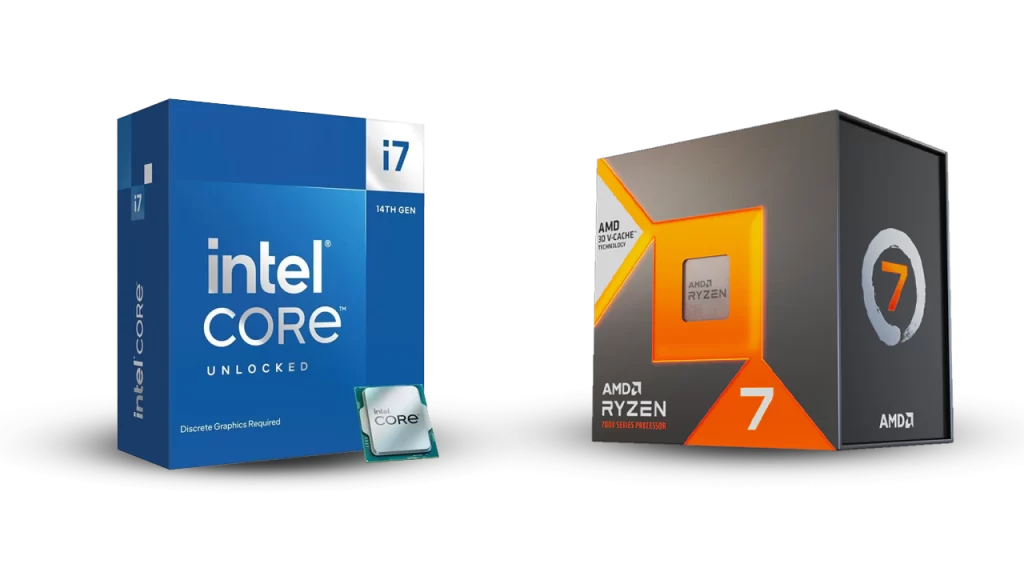
The Ryzen 7 7800X3D is the most powerful gaming CPU available, handily outperforming more costly competition from both Intel and AMD. The Ryzen 7 7800X3D is a tremendous bargain in the high-performance segment and the fastest gaming CPU available, with a price tag of $399 that is expected to drop shortly.
The Ryzen 7 7800X3D has eight cores and sixteen threads that run at 4.2 GHz base and 5.0 GHz peak clock rates. The device incorporates AMD’s Second-Gen 3D V-Cache technology, which exploits a 3D-stacked SRAM chiplet to offer an amazing 96MB of L3 cache, and to excellent effect: the final result is a comparably low-power chip with incredible gaming performance.
The Ryzen 7 7800X3D fits with AM5 motherboards which support the most recent connection technologies, including DDR5 and PCIe 5.0. With the 7800X3D, AMD now supports both auto-overclocking Precision Boost Overdrive (PBO) and Curve Optimizer but does not support direct frequency overclocking. The Ryzen 7 7800X3D consumes considerably less power than the Intel rivals, making it a far cooler CPU that won’t necessitate as many pricey upgrades, such as a hefty cooler, motherboard, and power supply. That means the 7800X3D provides excellent gaming performance while also being cooler, quieter, and less costly than a Core i9.
In terms of performance work, our test results reveal that the Core i7-14700K is a far superior all-rounder than Ryzen. For a total of 28 threads, the Core i7-14700K includes eight P-cores (high-performance) and 12 E-cores (efficiency). The P-cores have a base/boost speed of 3.4 / 5.6 GHz, while the E-cores have a speed of 2.5 / 4.3 GHz. Furthermore, the execution engine is supplied with 33MB of L3 cache and 28MB of L2 cache. The 14700K also has advanced connectivity, with DDR4-3200 or up to DDR5-5600 memory compatibility, as well as 16 lanes of PCIe 5.0 and four lanes of PCIe 4.0 from the CPU for M.2 SSDs. The 14700K has a power rating of 125W PBP (base) and 253W MTP (peak).
AMD Ryzen 9 7950X3D & Intel Core i9-13900K – Highest Performance Best CPU for Gaming
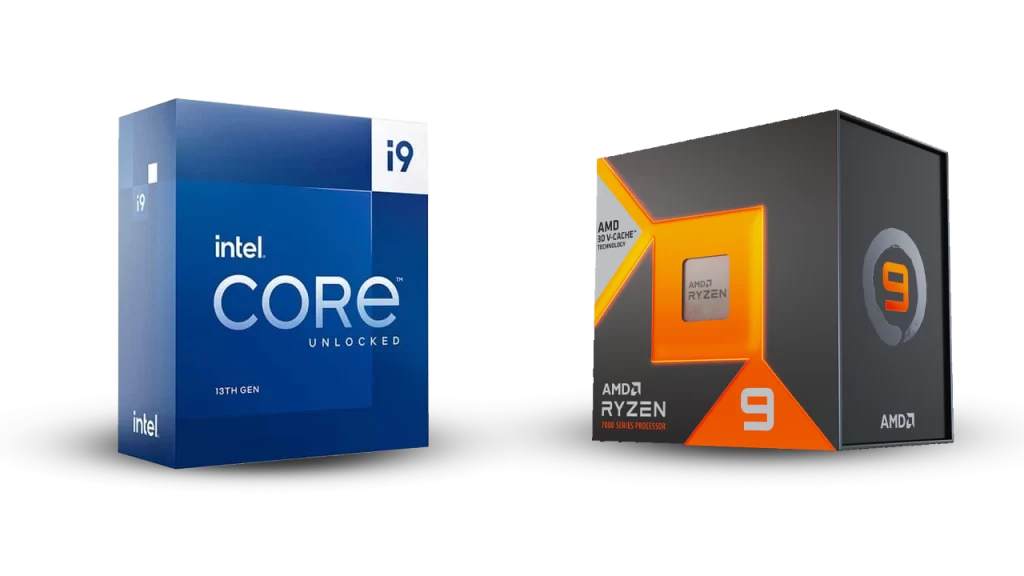
AMD’s $699 Ryzen 9 7950X3D is designed for gamers who want to blitz through CPU-limited video games while maintaining the threading heaviness of 16 cores to handle the toughest productivity jobs. The new processor includes sixteen Zen 4 cores and the company’s second-generation 3D V-Cache technology, which unlocks 128MB of L3 cache, enabling the fastest gaming performance offered on the market. The 7950X3D outperforms Intel’s fastest CPU, the 6 GHz Core i9-13900KS, by 13% overall and as much as 40%+ in several games in the tests we carried out.
AMD’s new Ryzen 7000 series CPUs necessitate a large cooler, thus choose a 240 mm-280 mm or larger AIO for optimal performance. Because the newest Zen CPUs are not backward compatible, and DDR5 memory is the sole choice, you’ll further require a new AM5 motherboard. Unfortunately, DDR5 memory remains significantly more costly than DDR4 memory, which must be included in your construction budget. However, at the top end, that isn’t as important – if you want to construct the ultimate fastest gaming machine, regardless of expense, the Ryzen 9 7950X3D is unquestionably the fastest gaming processor now available.
Although AMD’s Ryzen 9 5900X3D is faster the Core i9-13900K is still Intel’s fastest gaming CPU with a better performance-to-cost profile than the other Ryzen 7000 series processors. It even exceeds AMD’s Ryzen 9 7950X in our gaming benchmark and most heavily threaded content production workloads at $569, making it an excellent deal for high-end game streaming as well. It’s also the undisputed king of x86 single-threaded speed. Intel’s liberal sprinkling of more cores also propels it to the top of the core count chart for the first time since AMD’s Ryzen arrived in 2017.
Intel Core i5-13600K & AMD Ryzen 5 7600X – Mid-Range Best CPU for Gaming
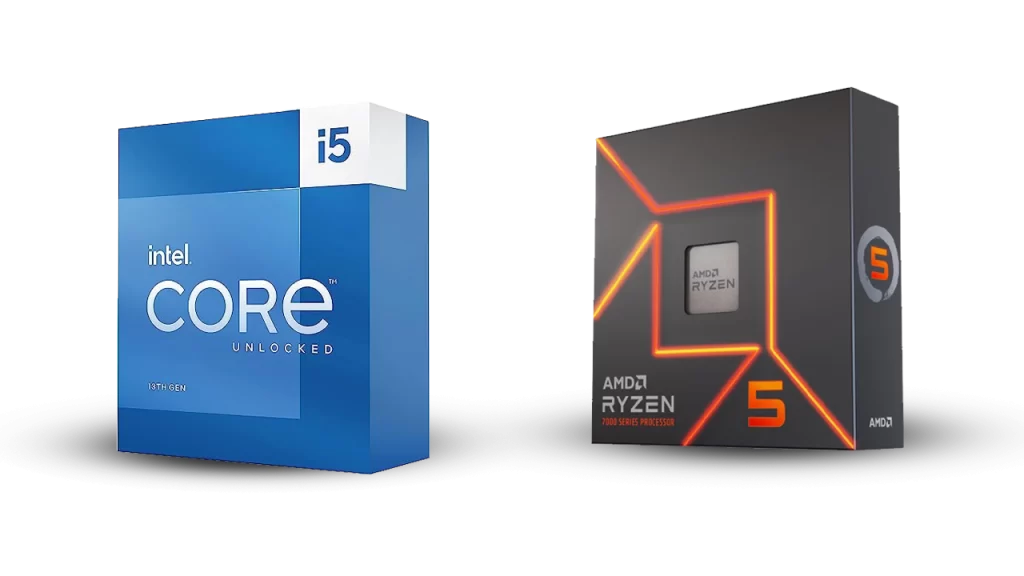
Our extensive testing reveals that the $319 Core i5-13600K is a fantastic gaming CPU – Intel increased the price by $30 over the previous-generation model, yet the basic 13600K outperforms AMD’s entire Ryzen 7000 series at 1080p, including the $589 variant. You can even skip the built-in graphics processor — you will not require it if you have a separate GPU — and achieve the same level of performance with the $296 Core i5-13600KF. The 13600K/F gives enough performance, even overclocking it to the same degree as the Ryzen 7 5800X3D, which is an outstanding achievement, and it is also within 5% of the $589 Core i9-13900K.
The Core i5-13600K has six threaded P-cores at 3.5 / 5.1 GHz and four E-cores at 2.6 / 3.9 GHz, for an overall count of 20 threads. This is complemented with 20MB of L3 cache and 24MB of L2 cache. The 13600K has a maximum power rating of 181W, yet it consumes substantially less power than its predecessor while providing significantly better gaming performance. Because of the decreased power consumption, the chip is compatible with a broad range of common air and water coolers, but you must ensure that your model accepts the LGA 1700 socket.
At $250, AMD’s six-core, 12-thread Ryzen 5 7600X processor provides decent performance. However, the absence of a DDR4 memory option (you must use expensive DDR5) and AMD’s higher motherboard expenses mean that this processor competes with the $300 Core i5-13600KF, putting the Ryzen 5 7600X below the Intel competition. The 7600X combines the Zen 4 architecture with the 5nm TSMC technology to give significant performance improvements over the previous generation, making it an excellent AMD gaming CPU in the $250 price range. The rival Core i5-13600KF, on the other hand, is 8% quicker at 1080p gaming and has significantly greater overclocking limits. In single- and multi-threaded productivity programs, the Intel CPU is also 3% and 39% quicker, respectively.
AMD also offers a less expensive option, the Ryzen 5 7600, which is our second choice for the best CPU for gaming overall, but even with overclocking, the 7600 performs around 5% worse in games.
AMD Ryzen 5 5600 – Budget Best CPU for Gaming
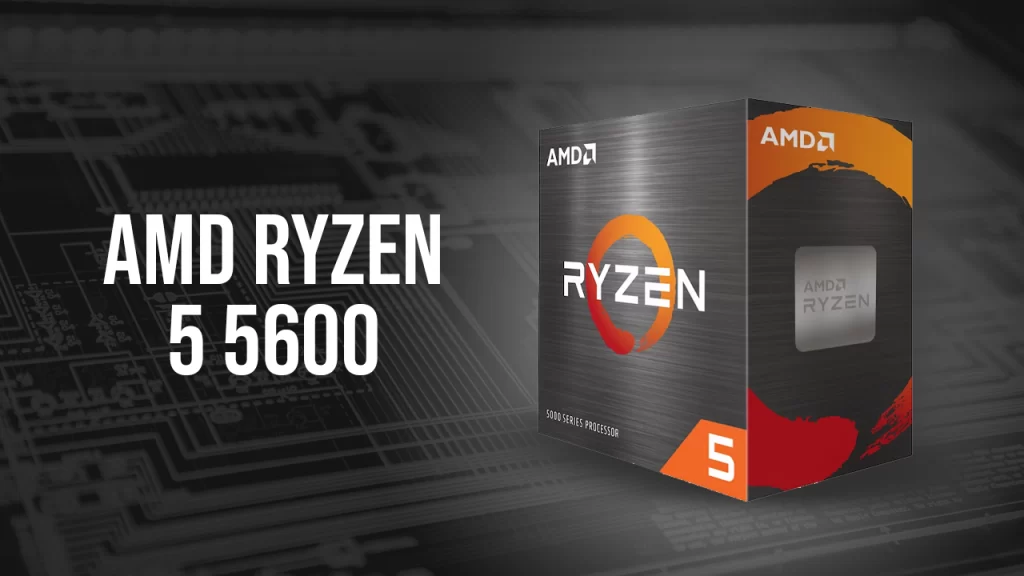
Our typical price range is $100 to $120, however, the $140 AMD Ryzen 5 5600 merits particular attention. With a strong balance of speed in both games as well as application workloads, this chip takes the top place as the category’s best budget AMD CPU for gaming, adding another level of affordability to the Zen 3 family. It is more expensive than the $106 Core i3-12100F, but it is more than worth it given its superior performance – the Ryzen 5 5600 is 10% quicker than the 12100F.
If you don’t mind using an AM4 motherboard from the previous generation, the Ryzen 5 5600 is an excellent value. The main disadvantage of the AM4 platform is that it is restricted to DDR4 (a good thing considering DDR5 pricing) and lacks PCIe 5.0 (very few SSDs are available at this speed, and GPUs don’t require it), but this isn’t an issue at this price point. If you’re upgrading an AM4 first-gen Ryzen system, the Ryzen 5 5600 is an outstanding value.
The Ryzen 5 5600X, a long-time favorite, is dethroned by the 5600. The 5600X is just 1% quicker than the Ryzen 5 5600 in gaming and multi-threaded PC tasks, but it has a 4% edge in single-threaded work. Having said that, the practical differences between the two CPUs will be nearly unnoticeable to the vast majority of users, although the Ryzen 5 5600X is $30 more expensive. As a result, the Ryzen 5 5600 is the 5600X-killer.
Closure:
The detailed description above presents the best CPUs in 2023, ideal for enhancing your gaming build with either the latest gaming technology or previous generation advancements. Opting for a future-focused gaming technology CPU in 2023 could be the ultimate choice for your gaming setup, ensuring top-tier performance.
Carefully evaluate your computing requirements and select a CPU that fulfills them, or consider a slightly faster option if your budget allows. Avoid blindly investing in the most expensive processor available without exploring alternatives. While pricier CPUs from AMD and Intel often signify superior performance, it’s essential to weigh your specific needs against the price.
Considering the swift pace of technological progress, envision purchasing a midrange CPU within five years that could match or surpass current top-tier processors. Regularly upgrading to a new midrange PC every few years may likely yield a faster system than someone relying on a five-year-old PC equipped with a high-end processor.
